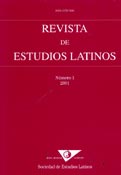Pudicitia, impudicia and impudentia in relation to pudor: a semantic study.
DOI:
https://doi.org/10.23808/rel.v5i0.87906Keywords:
Modesty; immodesty; morals; semantics.Abstract
Several terms of the pudor-pudere family invite a reflection on how certain aspects of moral judgement are expressed. Pudicitia and pudor both refer to modesty; such restraint in manners and in private life, however, relates either to long-term behaviour (pudicitia), or else to a dynamic ability (pudor) defending dignity in the face of passion. Pudor is thus meant to vanquish furor, and this idea is well expressed in certain elegiac poets, in Seneca’s tragedies and Valerius Flaccus’s epics. Immodesty (impudicitia) is rather to be identified over the long term, and the terms serves as antonym to pudor. Impudentia, despite equivalences in translation, denotes a lack of feeling of restraint, inducing bad behaviour, thus serving as antonym to pudor in its sense of restraint. The three words are much less polysemic than is pudor.
Downloads
References
BARDON Henri, 1965: «Rome et l’impudeur», Latomus 24-3, pp. 495-518.
BAYLON Christian et MIGNOT Xavier, 1995: Sémantique du langage, Paris, Nathan.
BOELS-JANSSEN Nicole, 1993: La vie religieuse des matrones dans la Rome archaïque, Rome, École Française de Rome.
DANGEL Jacqueline, 2003: «Les Muses de l’Histoire: l’énigme cicéronienne», G. Lachenaud - D. Longrée (ed.), Grecs et Romains aux prises avec l’histoire, Rennes, Presses Universitaires de Rennes, pp. 85-95.
DAUDE Jean, 2002: «Les substantifs abstraits de qualité», Ch. Kircher-Durand (ed.), Grammaire fondamentale du latin, t. IX. Création lexicale: la formation des noms par dérivation lexicale, Louvain - Paris, Peeters, pp. 225-305.
DION Jeanne, 1993: Les passions dans l’œuvre de Virgile: poétique et philosophie, Nancy, Presses Universitaires de Nancy.
MESLIN Michel, 1985: L’homme romain, Bruxelles, Éditions Complexe.
MOUSSY Claude, 1991: «The structure of signifié: the usufulness and limitations of analysis into releavant features (with applications to Latin )», R. Coleman (ed.), New Studies in Latin Linguistics, Amsterdam, J. Benjamins, pp. 63-73.
——, 1996: «L’antonymie lexicale en latin», P. Valentin - M. Fruyt (ed.), Lexique et cognition, Paris, P.U.P.S., pp. 109-120.
PALMIERI Nicoletta, 2001: «Pour une lecture de l’Amphitruo les souffrances d’Alcmène et la philosophie de Sosie», Cahiers du GITA 14, pp. 139-165.
QUELLET Henri, 1969: Les dérivés latins en -or, Paris, Klincksieck.
QUINTILLA ZANUY Mª Teresa, 2004: «La interdicción lingüística en las denominaciones latinas para “prostituta”», RELat 4, pp. 103-124.
THOMAS Jean-François, 2002: Gloria et laus: étude sémantique, Louvain - Paris, Peeters.
——, 2004: Recherches sur le champ lexical du déshonneur et de la honte en latin, Ouvrage original du dossier pour l’Habilitation à Diriger des Recherches, Université de Paris IV - Sorbonne [une édition est en préparation chez Peeters].
Downloads
Published
How to Cite
Issue
Section
License
Copyright (c) 2005 Revista de Estudios Latinos

This work is licensed under a Creative Commons Attribution-NonCommercial-NoDerivatives 4.0 International License.
The originals published in the printed and electronic editions of this journal are the property of the Revista de Estudios Latinos and can be circulated as long as the original source and authorship is made clear in any reproduction, full or partial, of the same, and as long as this is not done for commercial purposes.






